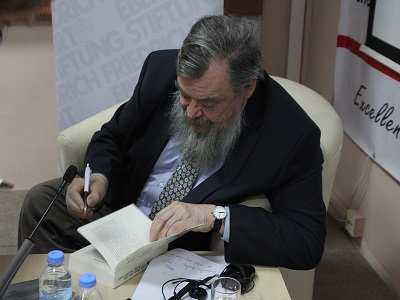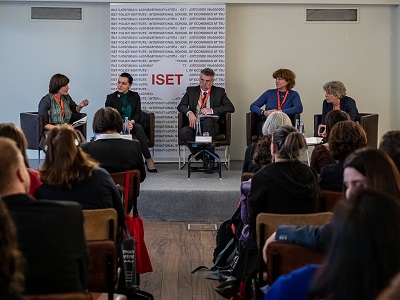- Details
On January 15, ISET had the privilege to host a living economic legend when Professor Erik S. Reinert visited the institute to participate in the Georgian-language launch of his book, How Rich Countries Got Rich, and Why Poor Countries Stay Poor. His work, which was originally published in 2007, has now been published in over twenty languages, and remains one of the most widely-discussed economic works of recent years.
The main message of the book is that neo-classical economics damage developing countries, mostly via adherence to the theory of comparative advantage of David Ricardo, an English economist of the XIX century. The theory posits the virtues of trade irrespective of the nature of the goods traded. Based on a long intellectual tradition started by the Italian economists Giovanni Botero and Antonio Serra, Professor Reinert stated that the country which trades increasing returns goods – e.g. high-end manufacture – has advantages over the country which trades diminishing returns goods – e.g. commodities.
- Details
November 15-16 witnessed the largest and most high-profile event of ISET’s year: the first international conference on gender economics entitled ‘Removing Obstacles to Gender Equality and Women’s Economic Empowerment’. The two-day event, hosted by ISET and the FREE Network (the Forum for Research On Eastern Europe and Emerging Economies), attracted academics from 14 countries, including Australia, India, Canada, the countries of the South Caucasus, Eastern and Western Europe.
The conference began with an opening address from Dr. Tamar Sulukhia, Director of ISET, who thanked ISET partners and the conference’s main sponsor, the Swedish government, for its support and commitment to the issues of women’s empowerment in Eastern Europe and the South Caucasus. Dr. George Sharvashide, Rector of TSU, Mr. Erik Illes, Head of the Swedish International Development Cooperation Agency, and Ms. Ekaterine Mikabadze, Deputy Minister of Economy and Sustainable Development of Georgia, also addressed the guests in attendance highlighting the importance of the topic.












